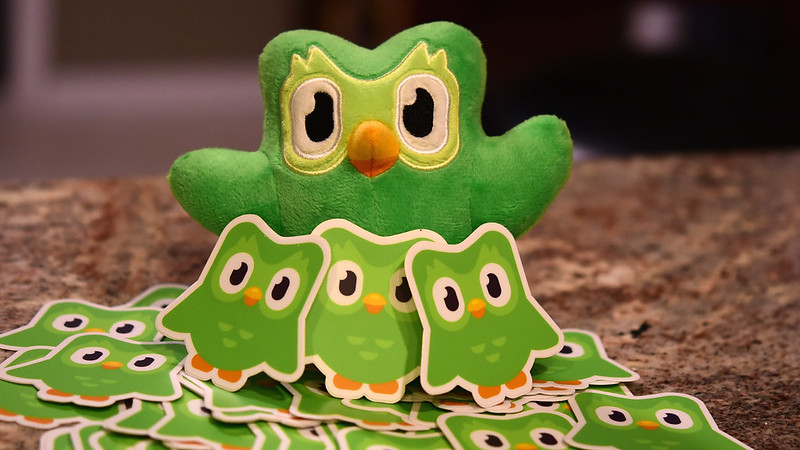Duolingo’s Monetization Rates Remain Unimpressive
The global language training market is expected to grow to $115 billion by 2025 from $61 billion in 2019 at 11% CAGR. Online language learning service provider Duolingo (Nasdaq: DUOL) recently went public and announced their first set of results.

Photo Credit: slgckgc / Flickr
Duolingo’s Offerings
Pittsburgh-based Duolingo went public after over a decade of operations. Duolingo initially began as a project by Carnegie Mellon University professor Luis von Ahn and his graduate student Severin Hacker in 2010. Luis, a MacArthur Fellow, grew up in Guatemala and had seen firsthand the impact that access to high-quality education can have on people’s lives. He believed that although education can help provide economic opportunity, it is also among the principal sources of inequality. People with fewer resources, especially in developing countries, have limited access, even to basic schooling. Together, they connected over the dream of building an intelligent learning system that could be informed by user engagement data and could deliver superior learning outcomes.
Today, Duolingo’s team of over 400 employees, has built a smartphone native service that is powered by data analytics and artificial intelligence and makes it easier for learners to stay motivated and achieve their learning goals. It has recorded more than 500 million downloads and has become the world’s most popular way to learn languages. In fact, it is the top-grossing app in the Education category on both Google Play and the Apple App Store. It offers courses in 40 languages and its learners complete over 500 million exercises every day.
Duolingo’s Financials
Duolingo continues to operate on a freemium model. Users can use Duolingo for free, and see an ad at the end of each lesson. It also offers a subscription-based service where learners enjoy an ad-free experience and access to additional features. As of March this year, approximately 5% of its monthly active users were paid subscribers of Duolingo Plus.
Duolingo recently reported its second-quarter earnings. Its Q2 revenues grew 47% to $58.5 million. The company continues to record losses and ended the quarter with a loss of $0.01 per share.
During the quarter, its total bookings grew 30% to $64.5 million, and subscription bookings grew 34% to $48.9 million.
Duolingo ended the quarter with 37.9 monthly active users, down by 9%, and daily active users grew 2% to 9.1 million. Number of paid subscribers grew 46% to 1.9 million.
For the third quarter, Duolingo expects revenues between $58.5 and $61.5 million. For the fiscal year, it expects revenues between $236 and $242 million. The market forecast revenues of $60.43 million for the quarter and $240.31 for the year.
Duolingo’s Partnerships
Recently, Duolingo announced two notable partnerships. It announced a partnership with the International Rescue Committee (IRC) to make language learning, as well as English testing, free. IRC works with recently resettled refugees, asylum seekers, asylees, and victims of trafficking across the US. As part of the partnership, Duolingo will launch a pilot program to provide thousands of additional Duolingo Plus subscriptions to more of IRC’s clients – including those from the Northern Triangle region. The partnership will expand access to fee waivers for the Duolingo English Test, to help reduce the barriers to higher education for refugees and those who are newly arrived in the US.
It also announced a similar partnership with the United Nations High Commission of Refugees (UNHCR) to create a new university counselor position at UNCHR that is focused on providing refugees with the help needed to carry through with university admissions and financial aid processes.
Duolingo’s IPO
Duolingo went public in July of this year. Prior to going public, it raised $183.3 million in eight rounds of funding. Its most recent round was held in November 2020 for $35 million and was led by Durable Capital Partners and General Atlantic. Its list price was $102 and was valued at $3.7 billion.
Duolingo’s stock is currently trading at $156.70 with a market capitalization of $5.89 billion. It reached a high of $204.99 in September and recovered from its low of $118.54 in August.
The online language learning industry is a highly competitive one. Similar players in the market include names like Rosetta Stone, Mango Languages, Babbel, and many more. The industry does not have a lot of learner loyalty because of its low switching costs and a consistent stream of new products and entrants. While Duolingo does have the advantage of a smartphone native offering, its weak monetization rates will continue to plague its financial model.
I am a daily user of Duolingo and use it to improve my French. For the last two years, I have spent an hour or more on Duolingo everyday. However, such discipline is rare, and therein lies the company’s monetization woes, notwithstanding the fact that the product is excellent.
Disclosure: All investors should make their own assessments based on their own research, informed interpretations and risk appetite. This article expresses my own opinions based on my own ...
more


